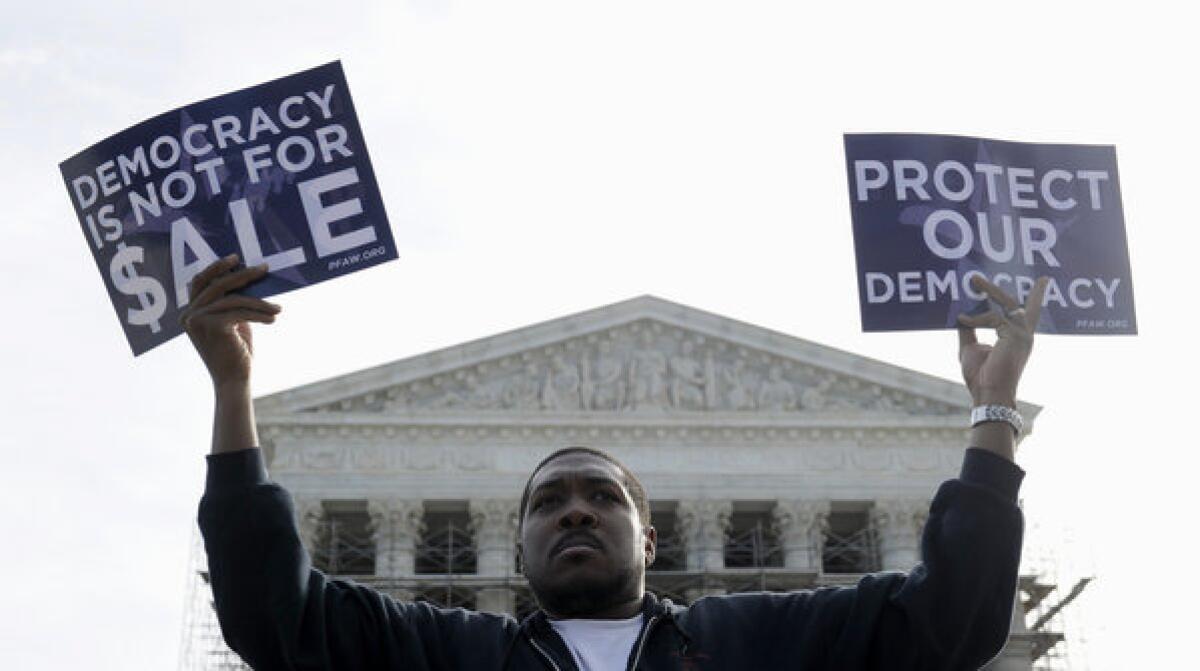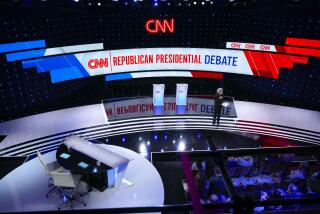Campaign spending limits at issue in Supreme Court argument

WASHINGTON -- The Supreme Court is scheduled to hear arguments Tuesday morning in a case that could give wealthy Americans even more clout with lawmakers and political parties, lifting one of the final restrictions on handing out campaign money.
Three years ago, a majority of the justices, led by Chief Justice John G. Roberts Jr., said in the Citizens United case that “independent” spending on elections was a form of free speech protected by the Constitution. That ruling struck down long-standing bans on such spending by corporations and unions.
But although that case opened the door to more widespread spending, it stopped short of striking down the Watergate-era limits on how much donors can give directly to candidates or party committees.
That has left the law in an odd posture. Wealthy people who want to influence campaign races can give millions of dollars to “super PACs” and other groups that pay for “independent” election ads, but they are barred by law from giving more than a total of $48,600 total to all members of Congress or more than $74,600 to various party committees.
FULL COVERAGE: The U.S. government shutdown
The current case could change that. The Republican National Committee, Senate Minority Leader Mitch McConnell (R-Ky.) and Alabama businessman Shaun McCutcheon are asking the justices to say that contributions also should be treated as “core political speech.”
If they win, wealthy Republicans or Democrats could each give the maximum amount allowed to a candidate in every congressional and Senate race, plus party committees -- as much as $3.6 million total. Because party committees and candidates can exchange funds, that money could be funneled by party leaders into a close race or races, tipping the balance of power in Congress.
Defenders of the election laws have been sounding the alarm. “It would be terrible for our democracy ... if one politician could directly solicit $3.6 million from a single donor,” said Lawrence Norden, an election-law expert with the Brennan Center, a liberal legal advocacy group in New York. “That is 70 times the median income for an American family. It would mean a tiny, tiny group of donors would wield unprecedented power and influence.”
Already, the money that funds election races for Congress and the presidency comes from a small sliver of the very rich, what the Sunlight Foundation called the “elite class that serves as gatekeepers of public office in the United States.” The nonpartisan group has tracked how a growing share of election money comes from the top 1% of the wealthiest Americans.
The existing limits stand on shaky ground with the justices. In recent opinions, Roberts has said the government may not try to “level the playing field” between candidates or prevent well-funded candidates from using their financial advantage to dominate the airwaves. The only justification for limiting contributions, the court has said, is to prevent “corruption or the appearance of corruption.”
That theme of corruption is the one that defenders of the current limits have stressed.
Fred Wertheimer, a longtime champion of the campaign funding laws, remains optimistic that the limits will survive -- and because of Roberts.
Roberts “is likely to be the key vote in deciding this case,” Wertheimer said, and he “has a different record on campaign finance issues than his conservative colleagues.”
PHOTOS: 2013’s memorable political moments
However, Wertheimer added, “if the Supreme Court reverses its past position and strikes down the long-standing aggregate contribution limits, it will open the door wide to corruption of our federal officeholders and government decisions.”
The challengers deny that, arguing that there is no threat of corruption if one wealthy person gives the maximum $5,200 to each of more than 460 candidates who run for the House and Senate next year.
“This is a limit on how many candidates you support, not on how much you give them,” said James Bopp Jr., an attorney for the Republican National Committee.
He cites the case of McCutcheon, an Alabama man who gave a total of $33,000 to various Republican candidates for Congress last year and wanted to give $21,000 more. He was stopped by the legal limit on total contributions to candidates, which now stands at $48,600.
McCutcheon “holds firm convictions on the proper role of government” and “opposes numerous and ill-conceived and overreaching laws,” he told the court, and he wants more “federal officeholders who share his beliefs.”
Follow Politics Now on Twitter and Facebook
More to Read
Start your day right
Sign up for Essential California for news, features and recommendations from the L.A. Times and beyond in your inbox six days a week.
You may occasionally receive promotional content from the Los Angeles Times.






